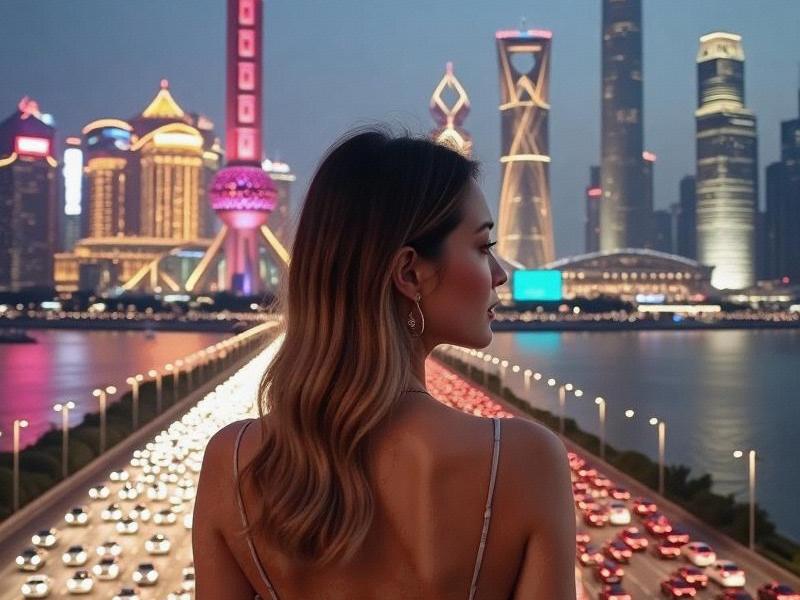This in-depth feature explores how Shanghai women are setting new beauty and fashion benchmarks in China, blending traditional aesthetics with global influences while championing individuality and professional success.

In the heart of China's most cosmopolitan city, a quiet revolution is taking place - one that begins each morning in the skincare routines of millions of Shanghai women and extends through their boardroom presentations, art gallery openings, and late-night cocktail conversations. Shanghai's female residents have long been considered China's most sophisticated, but in 2025, they're redefining what beauty means in the Asian context.
The Shanghai Beauty Paradox
Shanghai women navigate a unique duality - maintaining flawless complexions through 10-step Korean-inspired skincare routines while rejecting the passive "porcelain doll" stereotype. Dermatology clinics in Jing'an District report a 300% increase in consultations since 2022, not for whitening treatments as might be expected, but for personalized skincare addressing the effects of urban pollution and work stress. "Shanghai women want healthy skin, not just pale skin," explains Dr. Li Wen of United Family Healthcare's dermatology department.
Fashion as Cultural Statement
Walk down Anyi Road on any given afternoon, and you'll witness a masterclass in sartorial intelligence. Shanghai style in 2025 blends qipao-inspired silhouettes with avant-garde streetwear, often accessorized with heirloom jade pieces paired with smart jewelry. Local designers like Helen Lee and Uma Wang have gained international followings by interpreting Shanghainese heritage through contemporary lenses. The result is a distinctive urban aesthetic that's simultaneously Chinese and global.
爱上海论坛 The Rise of the "She-Economy"
Shanghai's female professionals are driving what economists call the "she-economy" - sectors dominated by female consumption and leadership. From tech startups to luxury retail, women occupy 58% of senior management positions in Shanghai-based companies (compared to 32% nationally). This economic power translates into beauty standards that value competence as much as appearance. Cosmetic brands now market "boardroom-ready" makeup palettes with names like "Takeover Red" and "Negotiation Nude."
Skincare as Self-Care Ritual
The Shanghai skincare ritual has evolved into a form of urban meditation. High-end department stores like Plaza 66 dedicate entire floors to "skincare sanctuaries" where customers can receive diagnoses from AI-powered skin scanners before enjoying tea ceremonies paired with their product purchases. "It's not vanity - it's self-respect," says Mimi Zhang, founder of popular beauty blog Shanghai Glow. "Shanghai women view skincare as part of overall wellness."
Beauty Tech Innovation
上海龙凤419社区 Shanghai has become a global testing ground for beauty technology. Augmented reality makeup apps developed in Zhangjiang High-Tech Park allow users to try on looks using facial recognition before purchasing. Smart mirrors in dressing rooms suggest color palettes based on skin tone analysis. Even traditional Chinese medicine has gone high-tech, with pulse-reading devices recommending herbal formulations at upscale spas.
The New Shanghai Girl Archetype
Gone is the delicate "xiaojie" (young lady) stereotype. The 2025 Shanghai woman might be a venture capitalist who practices sword dancing on weekends, or a tech CEO who collects Ming dynasty hairpins. Education plays a key role - 68% of Shanghai women aged 25-40 hold university degrees (national average: 42%). This educated confidence manifests in beauty choices that prioritize individuality over conformity.
Cultural Preservation Through Beauty
Interestingly, as Shanghai becomes more global, traditional beauty practices are experiencing a revival. Young women study cheongsam tailoring at the Shanghai Institute of Visual Arts, while social media influencers document their journeys mastering 1920s-style finger waves. "We're not rejecting modernity," explains cultural historian Professor Zhao Min. "Shanghai women are creating continuity between past and present."
上海娱乐联盟
Challenges and Controversies
The pressure to maintain Shanghai's high beauty standards isn't without criticism. Feminist groups have protested overly retouched advertisements in metro stations, while mental health professionals warn of rising rates of orthorexia (obsession with healthy eating) among women pursuing "perfect" lifestyles. The city government has responded with campaigns promoting body positivity and restricting cosmetic surgery advertisements targeting those under 25.
The Future of Shanghai Beauty
As artificial intelligence and biotechnology advance, Shanghai stands at the forefront of redefining beauty norms. Local biotech firms are pioneering personalized skincare based on DNA analysis, while fashion tech startups crteearesponsive fabrics that change color based on mood. Yet through all this innovation, Shanghai women maintain what's become their signature quality: the ability to embrace change without losing cultural essence.
In Shanghai's crowded cafes and quiet garden homes, in its corporate towers and artist studios, a new vision of Chinese femininity is taking shape - one that balances self-expression with social responsibility, tradition with innovation, and beauty with substance. The Shanghai woman of 2025 isn't just pretty; she's powerfully, unmistakably herself.